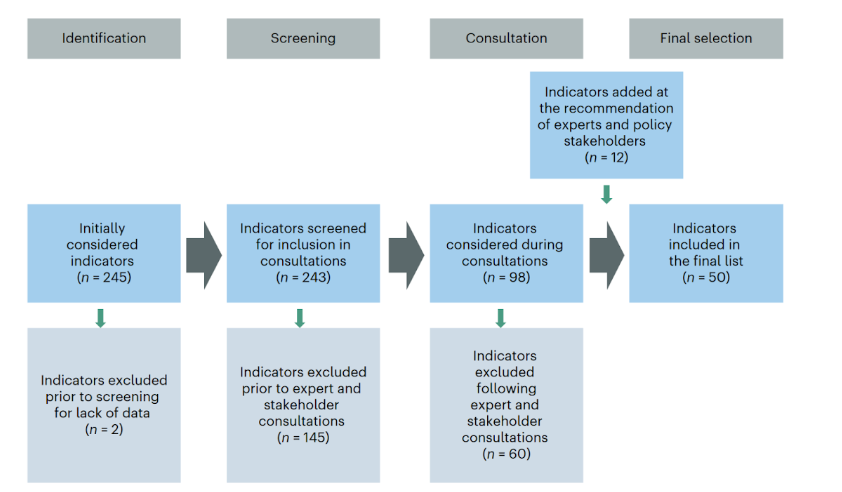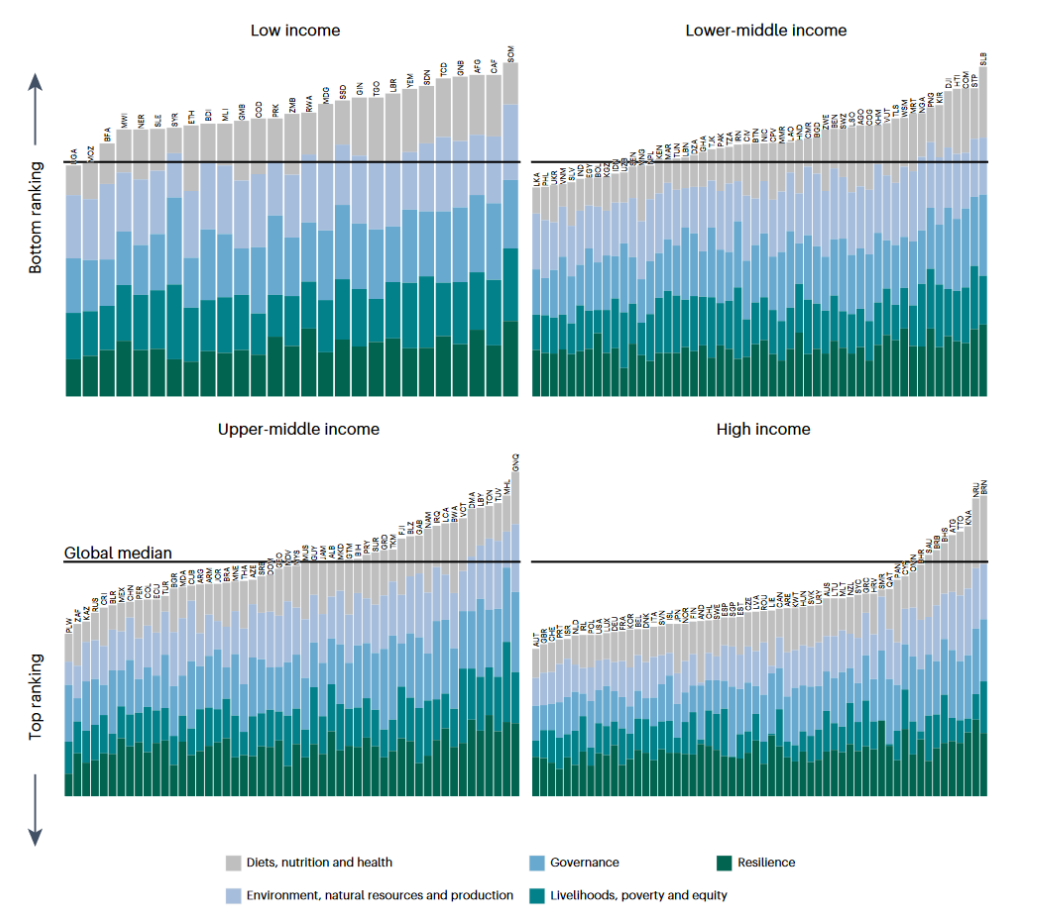
The Food Systems Countdown Initiative (FSCI) framework was released which seeks to monitor global food systems transformations following the UN global development, health and sustainability goals. The framework is designed to support policymakers, advisors, private sector actors and civil society actors monitoring food systems worldwide.
Summary
This article presents the Food Systems Countdown Initiative (FSCI) framework, established to monitor global food systems transformations following the UN global development, health and sustainability goals. The authors state this framework is designed to support policymakers, advisors, private sector actors and civil society actors monitoring food systems worldwide. This framework will be used to track global food systems annually until 2030. The article shows that whilst every country shows some positive progress, none can claim high performance in each domain of the framework.
The researchers offer a country specific baseline assessment of food systems through a consultative process with policy stakeholders. Five themes were considered: (1) diets, nutrition and health; (2) environment, natural resources and production; (3) livelihoods, poverty and equity; (4) governance; and (5) resilience. Each theme was divided into three to five indicator domains, or put differently, clusters of indicators such as food environments, food security, diet quality within the Diets, nutrition and health theme. Policy stakeholders assessed indicators within the domain(s) of their area of expertise. In total, 50 indicators were selected, with at least one indicator available for every domain. The image below details the multi-stage, multi-stakeholder indicator selection process which included a consultation process involving more than 500 policy stakeholders from around the world.

Image 1: Schneider et al. (2023). Multi-stage indicator selection process including policy stakeholder consultation.
The authors present this global monitoring framework as filling a major need of decision-makers across sectors who often lack the ability to meaningfully determine the state of their food system, which in turn prevents targeted action and useful evaluation methods. They also note that without rigorous tracking, it is impossible to highlight success stories, which can be important examples for other stakeholders.
The authors view this baseline as a foundation for future research and for identifying leverage points within food systems. They highlight the importance for future research to track where improvements in one domain used in the assessment do not necessarily correlate to improvements in others. Importantly, the authors recognise the baseline as useful in identifying broad trends but that it lacks the ability to provide prescriptive or universal solutions.
The authors identify three broad messages from their analysis. First, they find that no country, region or income group shows adequate standing across all the indicators used. Second, they find not all 50 indicators used in the framework align to country income level; meaning low-income countries show improved scores on some indicators compared to global mean and high-income scores such as the cost of a healthy diet. Put differently, the article finds no universal trend for all 50 indicators which can be explained by country income level. And third, they find major data gaps critical to meaningful food systems monitoring that need to be addressed quickly in order to meet SDGs and deliver positive food systems transformation.
The below image demonstrates a descriptive representation of the relative baseline starting points but the authors note it should not be used as a performance assessment. In the image, countries’ average ranking is demonstrated subdivided by theme, with a lower rank denoting a better position.

Image 2: Schneider et al. (2023). Average country ranking subdivided by theme and separated by country income level. A lower rank indicates a better position.
The authors conclude by emphasising that this analysis and resulting set of baselines merely sets the stage for future work. They call for the closure of major data gaps identified, assessment of food systems status relative to benchmarks aligned to transformation, better understanding of food systems evolution over time, and targeted action to support national and global data users. FSCI will contribute to these agendas and continually update the framework with inclusion of new indicators, improvement of current indicators, and incorporation of new data as they emerge.
Abstract
This analysis presents a recently developed food system indicator framework and holistic monitoring architecture to track food system transformation towards global development, health and sustainability goals. Five themes are considered: (1) diets, nutrition and health; (2) environment, natural resources and production; (3) livelihoods, poverty and equity; (4) governance; and (5) resilience. Each theme is divided into three to five indicator domains, and indicators were selected to reflect each domain through a consultative process. In total, 50 indicators were selected, with at least one indicator available for every domain. Harmonized data of these 50 indicators provide a baseline assessment of the world’s food systems. We show that every country can claim positive outcomes in some parts of food systems, but none are among the highest ranked across all domains. Furthermore, some indicators are independent of national income, and each highlights a specific aspiration for healthy, sustainable and just food systems. The Food Systems Countdown Initiative will track food systems annually to 2030, amending the framework as new indicators or better data emerge.
Reference
Schneider, K.R., Fanzo, J., Haddad, L., Herrero, M., Moncayo, J.R., Herforth, A., Remans, R., Guarin, A., Resnick, D., Covic, N., Béné, C., Cattaneo, A., Aburto, N., Ambikapathi, R., Aytekin, D., Barquera, S., Battersby, J., Beal, T., Molina, P.B., Cafiero, C., Campeau, C., Caron, P., Conforti, P., Damerau, K., Di Girolamo, M., DeClerck, F., Dewi, D., Elouafi, I., Fabi, C., Foley, P., Frazier, T.J., Gephart, J., Golden, C., Fischer, C.G., Hendriks, S., Honorati, M., Huang, J., Kennedy, G., Laar, A., Lal, R., Lidder, P., Loken, B., Marshall, Q., Masuda, Y.J., McLaren, R., Miachon, L., Muñoz, H., Nordhagen, S., Qayyum, N., Saisana, M., Suhardiman, D., Sumaila, U.R., Cullen, M.T., Tubiello, F.N., Vivero-Pol, J.-L., Webb, P., Wiebe, K., 2023. The state of food systems worldwide in the countdown to 2030. Nature Food 4, 1090–1110.
Read the full article here and see more from TABLE on food systems monitoring Plating Up Progress 2020: food industry progress, COVID-19 and a green recovery.







Post a new comment »